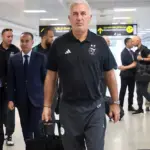Congo-Brazzaville reinstated by FIFA ahead of 2026 World Cup qualifiers
FIFA has officially lifted its suspension of the Congolese Football Federation (Fecofoot), reinstating the country’s right to compete in international football just months before the next round of qualifiers for the 2026 FIFA World Cup.
The decision, made public on Wednesday, 14 May 2025, brings to an end a suspension that had been in place since 6 February, triggered by concerns over political interference in the federation’s operations.
The announcement confirms that Congo-Brazzaville’s national teams and clubs are once again eligible to participate in all FIFA-sanctioned competitions.
In a formal letter addressed to Fecofoot, the sport’s global governing body confirmed that the federation had regained “all of its membership rights with immediate effect,” in accordance with Article 13 of FIFA’s statutes.
This reinstatement follows months of administrative and political turmoil that had thrown the future of Congolese football into serious doubt.
The crisis began in September 2024 when Fecofoot president Jean-Guy Blaise Mayolas and his executive committee—democratically elected to serve until 2026—were abruptly removed from office by a faction backed by Congolese Sports Minister Hugues Ngouélondélé.
The group seized control of the federation’s headquarters, and court orders were issued to expel staff, creating a climate of chaos and confrontation.
FIFA, which maintains strict rules against government interference in the internal affairs of national football federations, responded swiftly.
The organisation did not recognise the legitimacy of the “collective” that had assumed control and imposed a suspension on Fecofoot under Article 14 of its statutes, which demands independence from political influence.
Resolution came only after the duly elected leadership was able to reclaim control of Fecofoot’s offices, prompting FIFA to restore the federation’s rights.
Though the situation remains fragile, the move has allowed Congo-Brazzaville to re-enter the international football scene.
With the suspension lifted, the national team—known as the Red Devils—will return to action in June during the upcoming international break, albeit under modest circumstances.
Although mathematically still in the running, their chances of qualifying for the 2026 World Cup are considered effectively over.
The team lost two matches by forfeit during the March window due to the suspension and suffered a crushing 6–0 defeat to Morocco, severely damaging any realistic hope of qualification.
Despite the setbacks, the national youth team—nicknamed the Diablotins—is preparing to make its debut at the Maurice Revello Tournament (formerly the Toulon Tournament) from 3 to 15 June.
The under-20 side will compete against Denmark, Japan, and Mexico in the group stage, marking a significant milestone in the team’s development and international exposure.
While FIFA’s decision brings a degree of relief, the underlying issues that led to the crisis remain unresolved. The governance of football in Congo-Brazzaville continues to face serious scrutiny, with frequent organisational problems cited as a key reason for the nation’s persistent underperformance in African competitions.
Nonetheless, there are signs of cautious optimism. Among them is the recent opening of the Alima Academy, a football training centre founded by former French international Blaise Matuidi.
The academy aims to provide high-quality training opportunities for young Congolese players, signalling a potential path forward for a football system in urgent need of reform.
As the federation emerges from one of its most turbulent chapters, the challenge now lies in building a structure that ensures stability, autonomy, and progress—on and off the pitch.
La FIFA lève avec effet immédiat,l’interdiction sur la Fédération Congolaise ???????? de football ! pic.twitter.com/knhKeOmNKY
— Lassana Camara (@mauritaniefoot) May 14, 2025




